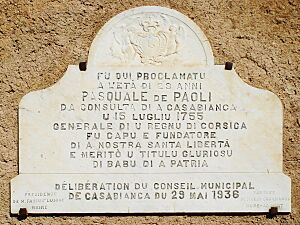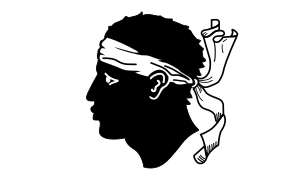Pasquale Paoli facts for kids
Quick facts for kids
Pasquale Paoli
|
|
|---|---|
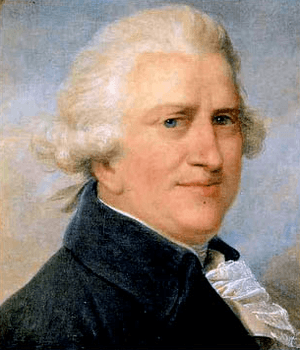 |
|
| President of Corsica | |
| In office 18 November 1755 – 9 May 1769 |
|
| Preceded by | Office established |
| Succeeded by | Office abolished |
| Personal details | |
| Born | April 6, 1725 Morosaglia, Corsica |
| Died | 5 February 1807 (aged 81) London, England |
| Resting place | Morosaglia, Corsica |
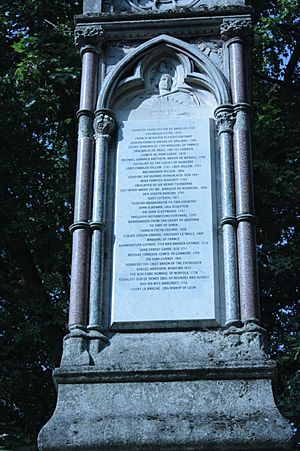
Pasquale Paoli (born April 6, 1725 – died February 5, 1807) was a Corsican hero, leader, and military commander. He led the fight for Corsica's freedom from Genoese and later French rule. He became the President of the Corsican government and even wrote the country's Constitution.
The Corsican Republic was a representative democracy, meaning its leaders were chosen by the people. Paoli was elected to his position, not appointed. This made him the top commander of the army and the main judge. While Genoa still held some coastal cities, Paoli's republic controlled most of the island from its capital, Corte.
After France took over Corsica in 1768, Paoli led the resistance. When Corsican forces were defeated at the Battle of Ponte Novu, he had to go into exile in Britain. He was very popular there. He returned after the French Revolution, which he first supported. Later, he disagreed with the revolutionaries and helped create the Anglo-Corsican Kingdom, which lasted from 1794 to 1796. After France took the island back, he went into exile in Britain again, where he died in 1807.
A young Corsican named Napoleon Bonaparte looked up to Paoli. Napoleon's family had helped Paoli during the French invasion. However, they chose to stay in Corsica and support the French king instead of going into exile with Paoli. Because of this, Paoli saw the Bonapartes as traitors. When Paoli regained power during the French Revolution, he tried to stop Napoleon from returning to his army position. In 1793, Paoli's supporters even arrested Napoleon briefly and outlawed his family. These events pushed Napoleon to become more of a French nationalist. Still, Napoleon always had mixed feelings about Paoli.
Contents
Biography
Early Life and Education
Paoli was born in a small village called Stretta, in Morosaglia, Corsica. His father, Giacinto Paoli, was a doctor and a patriot. Giacinto became one of the main leaders of the Corsican movement that fought against the rule of the Republic of Genoa. Before the 1700s, Corsicans mostly accepted Genoese rule. But by 1729, people felt the Genoese government was failing. There were many murders due to the custom of vendetta, pirate raids on villages, high taxes, and a struggling economy.
In 1729, a new tax led to a rebellion. The Genoese retreated to their forts and asked other countries for help, first from the Habsburg Holy Roman Empire and then from Bourbon France. The Corsicans were defeated by these professional armies but kept their organization. After giving up to the French in 1739, Giacinto Paoli went into exile in Naples with his 14-year-old son, Pasquale. Pasquale's older brother, Clemente, stayed in Corsica to keep in touch with the revolutionary assembly.
While in Naples, Giacinto made sure Pasquale received an excellent classical education. Pasquale was part of the Enlightenment movement, which valued classical ideas. In 1741, Pasquale joined the Corsican regiment of the royal Neapolitan army and served with his father.
Corsican exiles in Italy were looking for a skilled general to help their revolution. In 1754, young Pasquale suggested a plan for a Corsican government led by Corsicans. His father, Giacinto, believed Pasquale was ready to lead. He wrote to Vincente, suggesting a general election. This election made Pasquale the General-in-Chief of Corsica, leading all resistance efforts.
At that time, Corsica still had feuding family groups. Only the highland groups voted in the first election. The lowlanders held their own election and chose Mario Matra as their leader. Matra then attacked Paoli's supporters and asked the Genoese for help. Matra was soon killed in battle, and his support among the Corsicans disappeared.
Paoli's next goal was to push the Genoese back into their forts. His second goal was to create a constitution. This constitution was approved by the people in 1755. It set up a new republic, a government where people elected their leaders. The first election under this new system made Paoli president.
-
Oil by Sir William Beechey, about 1805
Leading the Corsican Republic
In November 1755, the people of Corsica approved a constitution. This document declared Corsica a free nation, separate from the Republic of Genoa. It was the first constitution written based on Enlightenment ideas. As the new president and author of the constitution, Paoli worked to build a modern state. For example, he started a university in Corte. Many historians believe Paoli wrote the very first written constitution for a nation.
French Takeover
Seeing that they had lost control of Corsica, Genoa gave the island to the French. This happened through the Treaty of Versailles in May 1768. It was Genoa's way of paying back France for helping defend the island. In September 1768, France began to conquer Corsica. Paoli fought a guerilla war from the mountains. However, in 1769, he was defeated at the Battle of Ponte Novu by a much larger French army. He then found safety in England. Corsica officially became a French province in 1789.
First Time in Exile
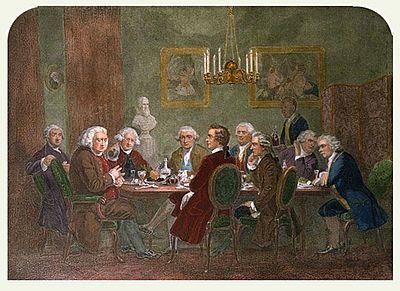
In London, Paoli quickly became popular with a group of successful, open-minded men known as The Club. Paoli was known for his outgoing personality. He would even show visitors his bullet-ridden coat, which amused the group.
Paoli's life story was written down by James Boswell in his book, An Account of Corsica.
After meeting with King George III, Paoli received money from the King. The understanding was that if he ever returned to Corsica as a leader, he would support British interests against the French. This was not just a deal; Paoli truly became pro-British and liked his new friends, including the King. This led him to support the royal family during the French Revolution.
Leading Corsica Again
By the time of the French Revolution, Paoli was seen as a symbol of freedom and democracy. In 1790, the French revolutionary National Assembly officially made Corsica part of France. They also offered forgiveness to exiles, so Paoli immediately returned to Corsica. He arrived in time for the election of local leaders, ran for president, and was elected by everyone. Napoleon Bonaparte, who helped organize the elections, was a big admirer of Paoli at this time.
Napoleon, who was on leave from his army, returned to work on a history of Corsica. He wrote to Paoli, asking for his thoughts and historical documents. It became clear that the two men had different ideas. Paoli thought Napoleon's history was not professional enough and too emotional. He refused to give him the documents. Napoleon did not yet know about Paoli's connections in Britain or his moderate views on royalty.
President of the British Protectorate
Paoli disagreed with the French Revolution after the King was executed. He decided to support the royalist side. He didn't make these views widely known. When the revolutionary government ordered him to attack Sardinia, he secretly told his nephew, who was leading the mission, to lose the fight. He was acting as a British agent because the British had an interest in Sardinia that they couldn't pursue if the French took it over.
However, Paoli had also sent Napoleon Bonaparte to lead some Corsican soldiers in an attack on La Maddalena Island in February 1793. The attack failed because the commander did not take proper military action, the island had been made stronger, and the defenders seemed to know exactly where the attackers would strike.
Napoleon realized what was happening during the fight and took unofficial command, but the attack still failed, and he barely escaped. After being a strong supporter of Paoli, Napoleon and his entire family angrily accused Paoli of being a traitor to the French government. Arrest warrants were sent to Corsica along with soldiers to take control from the royalists. The Paolists and royalists joined forces and defeated the Bonapartes, forcing them off the island.
Paoli then called a meeting in Corte in 1793, where he was president. Corsica formally broke away from France. He asked the British government, which was fighting revolutionary France, for protection. In 1794, the British sent a fleet of ships. This fleet had just been forced out of the French port of Toulon by a revolutionary army, following Napoleon Bonaparte's plan.
For a short time, Corsica was protected by King George III, thanks to the British fleet and Paoli's help. This time is known as the "Anglo-Corsican Kingdom" because George III was accepted as the head of state. However, Corsica did not become part of the British Empire. The relationship between Paoli's government and the British was never fully clear, causing many questions about who was in charge. Finally, the King asked Paoli to step down and return to exile in Britain with money. Since he had no other choices, he did. Soon after, the French took over the island again, and Corsica's independence ended until the 20th century.
Second Exile and Death
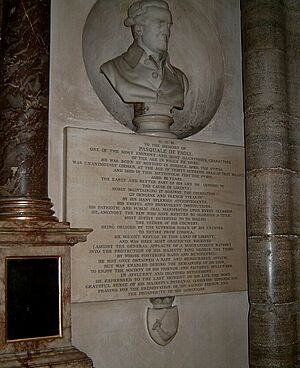
Paoli sailed for England in October 1795, where he spent his last years. Pasquale Paoli died on February 5, 1807. He was buried in Old St. Pancras Churchyard in London. His name is listed on the 1879 Burdett-Coutts Memorial among important graves that were moved.
A statue of his head was placed in Westminster Abbey. In 1889, his bones were brought back to Corsica on a British ship and buried at his family home under a memorial written in Italian.
Personal Life
Pasquale Paoli never married and, as far as we know, had no children.
Paoli and Italian Culture
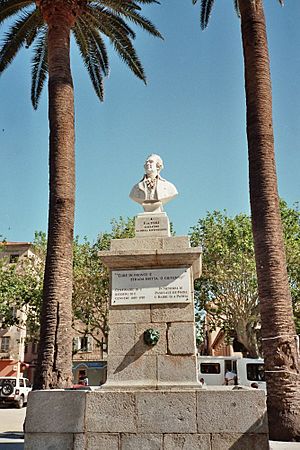
Pasquale Paoli lived long before the political movement known as Italian irredentism. However, there is no doubt that Paoli loved Italian culture. He saw his own native language, Corsican, as a type of Italian dialect. Corsican is very similar to Tuscan and Sicilian. Niccolò Tommaseo, who collected Paoli's letters, considered him one of the early thinkers who inspired the idea of a united Italy. The "Babbu di a Patria" (Father of the fatherland), as Corsicans called Pasquale Paoli, wrote the following message in 1768 against the French invaders:
Paoli wanted Italian to be the official language of his Corsican Republic. His Corsican Constitution of 1755 was written in Italian. The university he founded in Corte in 1765 also used Italian as the teaching language.
Paoli Remembered in the United States
The American Sons of Liberty movement was inspired by Paoli. Ebenezer McIntosh, a leader of the Sons of Liberty, named his son Paschal Paoli McIntosh in his honor. In 1768, the editor of the New York Journal called Paoli "the greatest man on earth." Several places in the United States are named after him. These include:
- Paoli, Colorado
- Paoli, Indiana
- Paoli, Kentucky
- Paoli, Oklahoma
- Paoli, Pennsylvania, which was named after "General Paoli's Tavern," a meeting place for the Sons of Liberty.
- Paoli, Wisconsin
See also
 In Spanish: Pasquale Paoli para niños
In Spanish: Pasquale Paoli para niños
- Corsican Italians
- History of Corsica
 | Emma Amos |
 | Edward Mitchell Bannister |
 | Larry D. Alexander |
 | Ernie Barnes |


